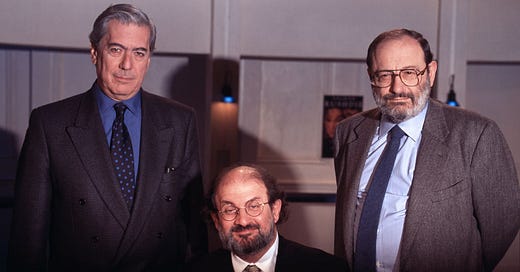When Umberto Eco’s second novel, Foucault’s Pendulum, was published in English, I reviewed it, and I must have been in an unusually bad mood, because I hated it, and said so. Not long after the review appeared I was at a literary gathering in a stunningly grand room in the Louvre, in Paris, and when I arrived the first person I saw coming towards me was Umberto Eco himself. We had never met before, and this was obviously not likely to be the happiest first encounter, or so I thought. But Eco, in a moment of expansive generosity, spread out his arms to embrace me, and cried out, in greeting, “Rushdie! I am the bullshit Eco!”
Also at that conference was the great Peruvian novelist Mario Vargas Llosa. During the next two days the three of us made two discoveries about one another.
The first was that each of us had attacked at least one of the others in print. I had dissed Eco’s book. Umberto had criticized Mario for being too right-wing. Mario had criticized me for being too left-wing.
The second discovery was that we all got on like a house on fire.
It was Umberto who suggested we should now call ourselves The Three Musketeers. (This, remember, was the time of the Three Tenors, Pavarotti, Domingo and Carreras.) I remember asking, “Why Musketeers? Why not, for example, The Three Stooges?”
“No,” Umberto insisted. “It has to be Musketeers, because first we were enemies and now we are friends.”
Over the years we performed together several times as a sort of literary triple-act, in Paris, in London, and in New York. I like to think we put on a good show.
When I last saw Mario, at a literary event in Peru, we spoke of Umberto, and made a toast in his memory. Now there are only Two Musketeers.





I think that no matter what, people need to push aside the bullshit and talk to each other face to face and say, "Do you hate me? Da you want to fight me?" That's how I feel when it comes to Twitter. Everything on Twitter moves on hypersonic speeds and there's no room for forgiveness. It's getting old. I enjoy a little teasing here and there. But when people send you letters with anthrax over beating them in a game of Call of Duty, this is not about discussion anymore. But this story should help everyone learn to get along, hopefully. You don't have to move in with your enemies, but learn to have unemotional disagreements. And to get people cancelled or fired, is not the way of moving the needle. Maybe I'm just bullshitting myself, but it's odd to me. Is this odd for anyone else?
Enjoyed reading this. How refreshing to read about people who could be honest about each other's work, and yet get along famously by agreeing to disagree. Feels like this could not happen anymore?